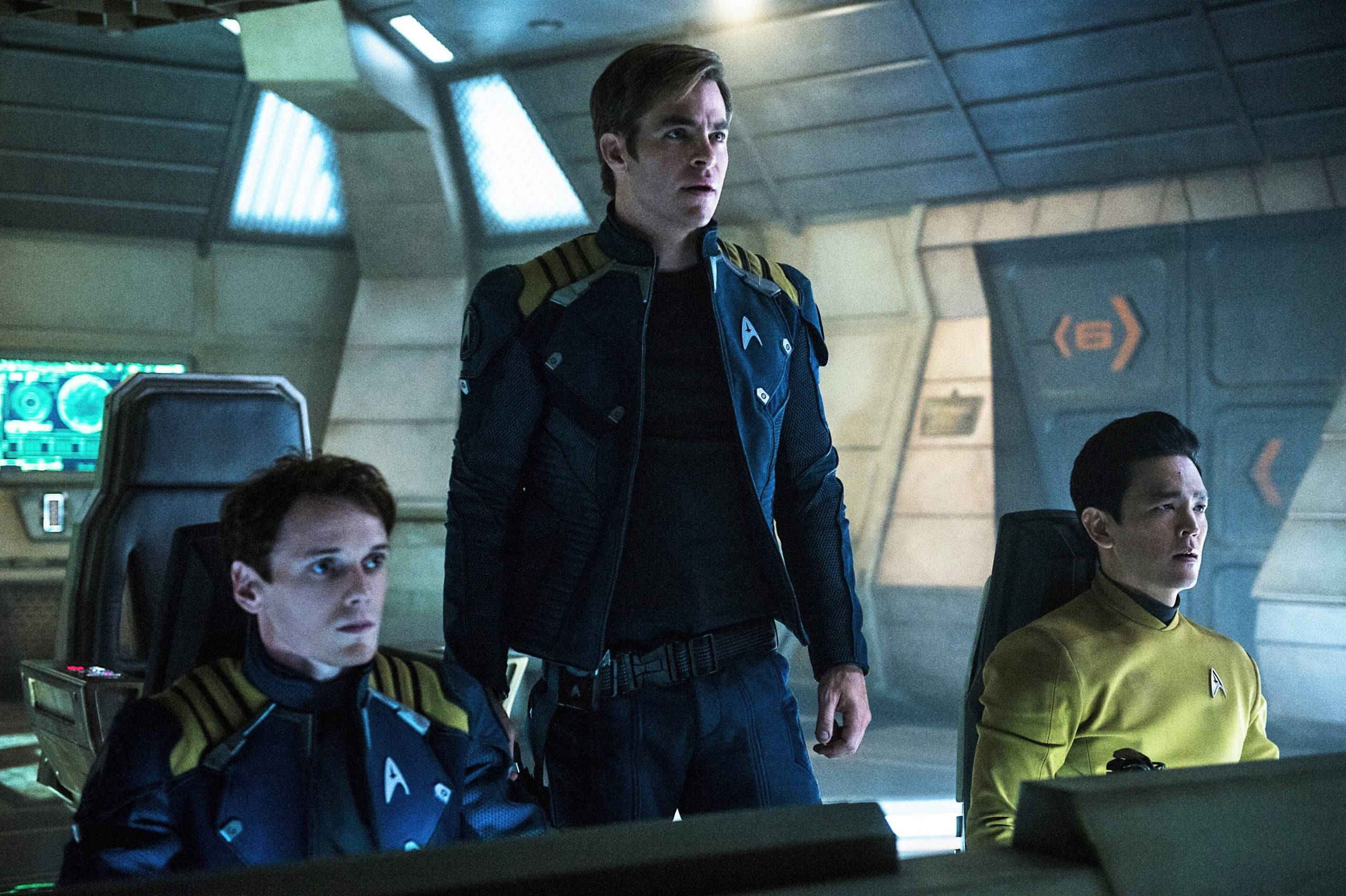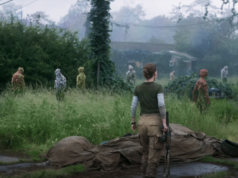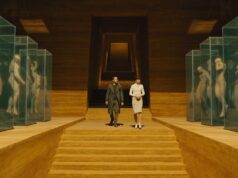After pretending so hard to be about a lot more than that, this Star Trek reboot franchise finally comes out of the closet as what it is: action
Star Trek Beyond (2016)
Directed by Justin Lin. Written by Simon Pegg and Doug Jung. Starring Chris Pine, Zachary Quinto, Karl Urban, Zoe Saldana, Simon Pegg, John Cho, Anton Yelchin, Idris Elba, Sofia Boutella, Joe Taslim and Lydia Wilson.
Ever since a modern reboot franchise came out, Star Trek fans (or Trekkies) haven’t been very pleased. One of the main complaints I’ve heard is that these new movies are much more action-oriented and less concerned about exploring ideas like the classic series used to be. It is true that Star Trek (2009) and Star Trek Into Darkness (2013) had a lot of action (too much, actually), but at least they felt fresh and exciting thanks to the bold way they bent the show’s original timeline to create an alternate version full of references. But the same cannot be said about this Star Trek Beyond, a movie that tries hard to stand on its own with an original plot but only makes evident the chief purpose of the franchise: action.
Written by Simon Pegg & Doug Jung, and directed this time by Justin Lin (Fast & Furious, Fast Five, Fast & Furious 6) since J. J. Abrams was busy with Star Wars: The Force Awakens (2015), Star Trek Beyond takes place three years into the USS Enterprise’s five-year mission. You know: to explore strange new worlds, to seek out new life and new civilizations, to boldly go where no one has gone before. After docking at Starfleet base Yorktown, a remote outpost in Federation space, Captain James T. Kirk (Chris Pine) and his crew venture into an uncharted territory where ruthless aliens attack them and leave them stranded on a remote planet. Now, they must reunite so they can stop the aliens’ dangerous threat to the Federation before it’s too late.
Narrated by Kirk, the movie follows a very formulaic structure, typical of a TV series episode, with the Enterprise crew split into small groups in a hostile environment and having to get back together. We have Spock (Zachary Quinto) and McCoy (Karl Urban) bonding and searching for survivors; Kirk and Chekov (Anton Yelchin) trying to locate the starship’s wrecked saucer section with the help of alien Kalara (Lydia Wilson); Scottie (Simon Pegg) being rescued by alien scavenger Jayla (Sofia Boutella); and Uhura (Zoe Saldana), Sulu (John Cho) and other survivors captured by Krall (Idris Elba), the insane leader of the attacking aliens.
First, if there’s one thing that definitely works in Star Trek Beyond, it’s its sense of familiarity. The actors seem more comfortable than ever in their roles, embodying their iconic characters almost like the original actors did. It is a huge pleasure, for instance, to see Kirk and McCoy drinking together and talking like old pals. On the other hand, although it’s always great to see an attempt at character development, Spock’s whole drama as he deals with his own death (or his old self’s death) doesn’t offer as much depth as it should and remains only superficial, despite the nice nod to Leonard Nimoy’s passing. Likewise, another actor who will be missed is Yelchin, who died in a car accident a month prior to the movie’s release.
While Justin Lin doesn’t seem to be the most appropriate choice for a Star Trek movie, he is exactly what the producers were looking for. He goes for an epic feel and delivers what is expected in terms of action, but the problem is that his direction is so frenetic, with the camera shaking so much in the action scenes, that you will probably feel dizzy or unable to follow most of what is happening. And his overuse of Dutch angles and exaggerated camera movements only show how hard he is trying to look stylish even though he isn’t. At least the converted 3D doesn’t make it so much worse and looks better than most out there.
Making great use of a stunning production design when showing the Enterprise and Yorktown, Star Trek Beyond also benefits from spectacular visual effects, especially in the urgent scene that shows the alien attack on the starship, which turns out to be one of the few action scenes in the movie that works — and it is hard not to feel anything when you witness the destruction of the Enterprise. Besides, the movie deserves credit for its makeup and score, with Michael Giacchino reusing his beautiful main theme to make something that sounds melancholy and epic.
But despite all the good technical work, Star Trek Beyond gives only occasional hints that it could be more than what it is in terms of narrative, like, for instance, when we see Kirk dealing with his own personal doubts and deciding to leave the Enterprise. The script is poor and the dialogue can be terrible, full of cheesy lines that don’t mean anything (“To save you from yourselves”) and terrible jokes (“That’s one heck of a cold”). The sense of humor is in fact mostly pedestrian, despite a few inspired moments (such as a tracking device joke) — and I can’t see what is supposed to be funny about the scene in which Spock is beamed up and McCoy is left behind.
Even so, the biggest problem with this movie is how hard it can be to care about anything. Spock gets wounded, but that never feels dangerous or creates any sense of real urgency (we never think he could actually die), while Krall is just a lame villain with lame motivations. It’s as if the writers had decided to come up with just about any justification for his hate toward the Federation, and there isn’t much that Idris Elba can do with such a one-dimensional character. Like I said, the film is only interested in non-stop, perfunctory action.
Trying hard to make Star Trek accessible to modern audiences, Justin Lin wants to turn it into forgettable, action-packed silliness at the expense of thought-provoking ideas, and so Star Trek Beyond never goes “beyond” anything, really. I heard recently that J. J. Abrams plans to direct a fourth movie, which may be a great thing. Lin, on the other hand, should go back to the brainless action of The Fast and the Furious franchise, because that’s what he is good at.





